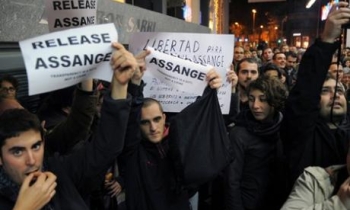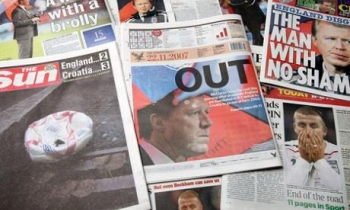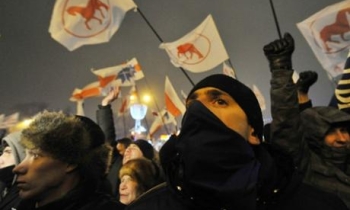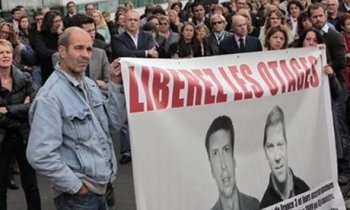NEW YORK: With many newspapers already limited in their foreign coverage by the ongoing Iraq War, and some budget cutbacks, the current MIddle East conflict -- which escalated over the weekend with new attacks on both sides and numerous civilian casualties -- has thrown a new wrench of staffing and news space demands.
Although most foreign editors say they have been able to keep their Iraq-dedicated staffers in that war-torn country as the Lebanon-Israel violence unfolds, they admit having to shuffle other reporters and photographers to properly cover the latest Middle East conflict.
"It has totally hijacked our foreign coverage," Ethan Bronner, deputy foreign editor at The New York Times, said about the new violence. "It is taking up an enormous percentage of our attention. It is not unlimited, what can do in the paper."
The Times, which has sought to keep at least four staffers in Baghdad during the past 18 months, has been able to maintain that number during the recent Israel-Lebanon conflict, Bronner said. But he said other reporters, from New York to Paris, have had to relocate to the Middle East to handle the new skirmishes.
"We are refiguring our staff," he said Monday. "We are just deciding some of it in the course of today."
In recent months, the Times has kept two staffers in Jerusalem, and one each in Cairo and Dubai, Bronner said. Since the attacks on Lebanon escalated, the Dubai reporter has relocated to Beirut, while the Cairo reporter, who was on vacation in the U.S., has gone back to report from an undetermined site in the region.
In addition, former Cairo correspondent Neil MacFarquhar, who has recently been based in San Francisco, is heading to Damascus while Jad Mouawad, a business reporter based in New York who is Lebanese, flew to Beirut two days ago to report on the story. Craig Smith, who is based in Paris, also relocated to the region, arriving in Gaza three days ago, Bronner said.
"Iraq is still a huge story, but they are all interlinked," he said. "Right now, Lebanon is the big story."
McClatchy Newspapers, which took control of the former Knight Ridder foreign bureaus when it bought that company, has maintained its Iraq staffing, with its two-person bureau there unchanged. But, foreign editor Mark Seibel said, other staffing shake-ups have been necessary to handle the Lebanon story. Among them: moving the Nairobi reporter to Amman, Jordan; the Berlin reporter to Israel; and the Cairo reporter to Beirut.
Seibel also said Jerusalem reporter Dion Nissenbaum has remained on the job, without a break since June 25. "We have pretty much moved everyone who is not in Baghdad into the Lebanon region," Seibel said. "If it goes on for very much longer, we will have to look at replacing folks. At some point, we have to stand people down."
At The Washington Post, foreign editor Dave Hoffman said the paper has maintained coverage with its regular Beirut and Jerusalem bureaus, which contain one staffer each. He also said the paper's Iraq coverage has not diminished, but declined to say how many people were in that war-torn country.
"It changes, we are adding people as we see fit," Hoffman said of the Lebanon and Israel situation. "We are bringing other people in from other places as needed." He said the paper had sent its Paris correspondent, John Anderson, to Gaza recently, but had no other specific staffing information.
"As it gets bigger and more demanding, we bring in more people," he said. "This is a big, front page story. But Baghdad is a big important story. We are going to cover them both."
At the New York Daily News, nearly all of the on-scene reporting in Lebanon and Israel has been done with stringers, according to National Editor Mark Moody. He said the paper has used five stringers in the region, including two in northern Israel, and one each in Jerusalem, Gaza, and Beirut. But he says they have paid off, noting that stringer Annia Ciezadlo was at the Beirut airport when it was bombed. "Those people are more plugged-in than any staffer would be," he said.
At Newsday in Melville, N,Y., which has seen a string of foreign bureaus close since last year - including its China, Africa and Latin America offices - the Lebanon-Israel attacks were timed well to happen this year instead of in early 2007, according to foreign Editor Roy Gutman. That's because, by next spring, the paper's Beirut bureau is set to close as well. "We are supposed to have all of our bureaus closed in a year and a half," he said of the Beirut and Islamabad offices. Until then, the one-person Beirut office continues.
Since the Lebanon story broke, Newsday has added at least one staffer to cover the fighting, moving its London reporter to Gaza two weeks ago. He left last Thursday, Gutman said, but is likely to return. "We are considering sending someone in to the Israel side, we have a first class stringer there now," he said.
Gutman, who covered the lsrael invasion of Lebanon in 1982, said the paper is not planning to increase staffing heavily in the area unless the fighting truly grows. "You don't have an all-out war in Israel yet, you don't have ground forces in Lebanon," he pointed out. "Were that to occur, or were Hezbollah to attack in a major way, we would send someone over there from here. We are poised to do it."
As far as Newsday's Iraq staffing, it has not existed since late 2005 when the last lone bureau chief left. "We are still considering our situation there," he said.
At The Boston Globe, what appeared to be a negative change at the time may have turned into a positive, according to foreign editor James Smith. In March, the paper essentially shutdown its full-time Iraq coverage when it relocated its two Baghdad reporters, Thanassis Cambanis and Anne Barnard, to Jerusalem to replace the lone reporter there. With the recent attacks and counterattacks, the couple, who are married, have been all over the story.
"You could call it brilliant foresight or luck," Smith said. "We have also worked with a couple of stringers in Beirut and one in Jerusalem. I don't know how we will proceed." When asked how the new demands of the Israel-Lebanon story have affected efforts to cover Iraq, Smith said, "We have built much of our foreign staff on the Middle East since Sept. 11, so it doesn't really feel like it is distracting us." But, he added, "It is not the quiet summer I was hoping for."
Joe Strupp (jstrupp@editorandpublisher.com) is a senior editor at E&P.









